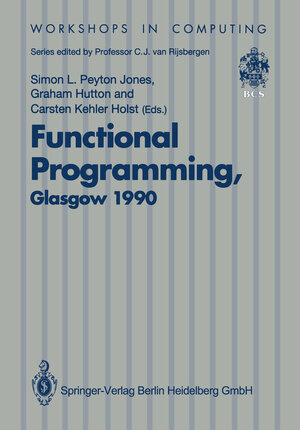
×
![Buchcover ISBN 9783540196679]()
Functional Programming, Glasgow 1990
Proceedings of the 1990 Glasgow Workshop on Functional Programming 13–15 August 1990, Ullapool, Scotland
herausgegeben von Simon L. Peyton Jones, Graham Hutton und Carsten Kehler HolstInhaltsverzeichnis
- Lifetime Analysis.
- Compiling Laziness by Partial Evaluation.
- Strictness Analysis in 4D.
- An Algorithmic and Semantic Approach to Debugging.
- Abstract Interpretation of Term Graph Rewriting Systems.
- Compile-Time Garbage Collection by Necessity Analysis.
- Improving Full Laziness.
- Towards Binding-Time Improvement for Free.
- Towards Relating Forwards and Backwards Analyses.
- PERs Generalise Projections for Strictness Analysis.
- Functional Programming with Relations.
- Abstract Interpretation vs. Type Inference: A Topological Perspective.
- Analysing Heap Contents in a Graph Reduction Intermediate Language.
- Is Compile Time Garbage Collection Worth the Effort?.
- Generating a Pattern Matching Compiler by Partial Evaluation.
- An Experiment using Term Rewriting Techniques for Concurrency.
- Type Refinement in Ruby.
- Normal-Order Reduction Using Scan Primitives.
- Calculating Lenient Programs’ Performance.
- Problems and Proposals for Time and Space Profiling of Functional Programs.
- Solid Modelling in HASKELL.
- Differentiating Strictness.
- Generalising Diverging Sequences of Rewrite Rules by Synthesising New Sorts.
- Concurrent Data Manipulation in a Pure Functional Language.



